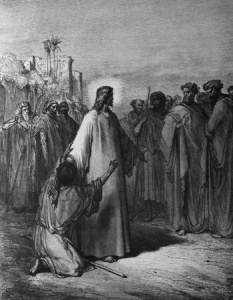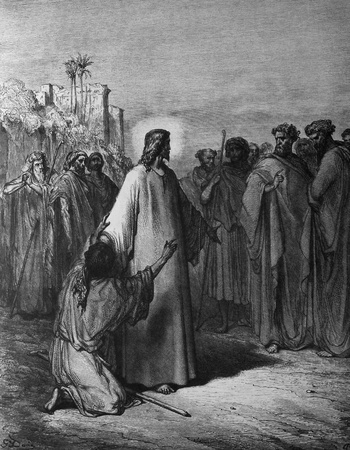
“I believe; help my unbelief!” Too many times it seems that just as in the biblical passage this cry was taken from, we approach God for some healing or restoration and nothing happens … at first.
In Mark 9:14-29 is the story of the “Healing of a Boy with an Unclean Spirit”, as the ESV referred to the passage. Parallels to the passage are in Matthew 17:14-21, and Luke 9:37-43. The story is essentially the same in all three accounts, but in Matthew, this boy is said to be an epileptic—he’s “moon struck,” a lunatic. In ancient times epilepsy was thought to be associated with the supernatural power of the moon. So the epileptic behavior was the result of the influence of demons or unclean spirits.
To set the scene, we find that Peter, John and James are returning with Jesus from His transfiguration. They see a crowd ahead gathered around some of the other disciples, who are arguing with the scribes, the ordained theologians of the Jews. Jesus asked his disciples what they were arguing about. A man in the crowd said he had brought his son for healing because he has “a spirit that makes he mute.” It convulses him and throws him to the ground; sometimes into the fire. “So I asked your disciples to cast it out and they were not able.”
Jesus immediately recognized the implications drawn by the crowd and the scribes: the disciple’s inability to heal the boy casts doubt on the message they preach; and ultimately the message Jesus himself preaches. We see this same issue occur repeatedly throughout the ministry of Jesus (Mark 2:1f; 8:11f; Matt. 12:38f; John 2:18f; 6:14; 6:30; 12:18). He condemned the crowd as “faithless,” and called for the boy to be brought to him. As the boy approached, the spirit seized him; the boy cried out and fell to the ground in a convulsion.
Jesus asked how long this has been happening to the boy, and his father said from childhood. The boy was often falling into the fire or water. The father then respectfully asked, “But if you can do anything, have compassion on us and help us.” Jesus then repeated his conditional statement—IF you can—declaring that everything is possible for him who believes.
The father immediately responded, “I believe. . . . Help my unbelief!” Jesus saw that a crowd was gathering around them, so he rebuked the spirit, commanding it to come out and never enter the boy again. The spirit shrieked, convulsed the boy violently, and came out. The boy seemed to be dead, but Jesus took him by the hand and the boy stood up. There are three reactions to the work of Christ here.
The crowd and the scribes represent individuals who may seek signs and wonders, but are deaf to the call to faith. They stand on the outskirts of the work of Christ, speculating and observing, but generally are unmoved by what they see. Like in the Parable of the Sower, the Word of God confronts their unbelief, but fails to penetrate the hardness of their hearts. They are the hard soil of the path. The unbelief in the lives of Christians is of the last two types: the father and the son.
The father represents those who hear the call to faith upon their life, yet recognize their inability to respond without the help of Christ. Overwhelmed by the continuing bondage of his son, the father’s attention to the world chokes his belief in Christ. He is (they are) the soil choked by weeds and the cares of the world.
Christians confess an intellectual assent of the power of Christ to heal, to move in their lives and the lives of others, yet they fall into unbelief like the father when their belief is not empirically validated. They pray; they read the Word of God; they stand on its promises; but nothing changes. So the cares of the world rise up like weeds and choke the Word of God. An encounter with the true Christ reveals to them, as to the father, they had a mere expectation of God, which they had called belief. In the presence of Christ, the father sees his confessed “belief” as unbelief, and cries out for help. Only the presence of Christ can reveal this unbelief; only the power of Christ can heal it.
The boy represents those who are fully aware of the hopelessness of their situation, and see no way out. He (or they) may even believe it is God’s will for his life. He (or they) may intellectually affirm that Jesus could heal or save him. But he doesn’t believe it will happen to him. He is (they are) the rocky soil.
Long ago they succumbed to the rocky soil of their lives that prevented the Word of God from taking root. With the approach of Christ, they fear their shallowness will be exposed. But they cannot hide their unbelief. It rises up and chokes out the cry of belief from their mouth even as it is spoken. But the Christ who comes is gracious. He took the boy by the hand and raised him up—healed of the demons that he had lost hope of ever being released from.





